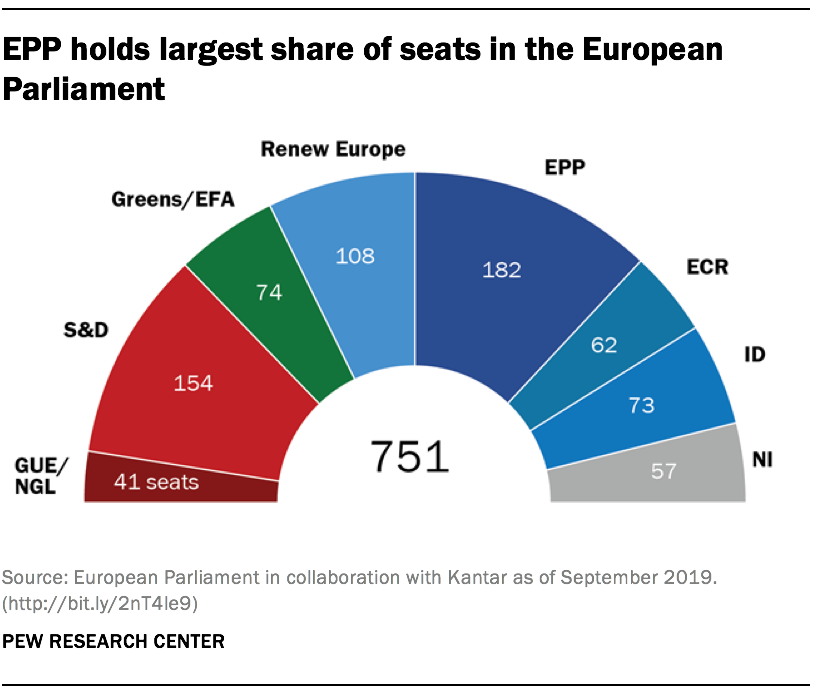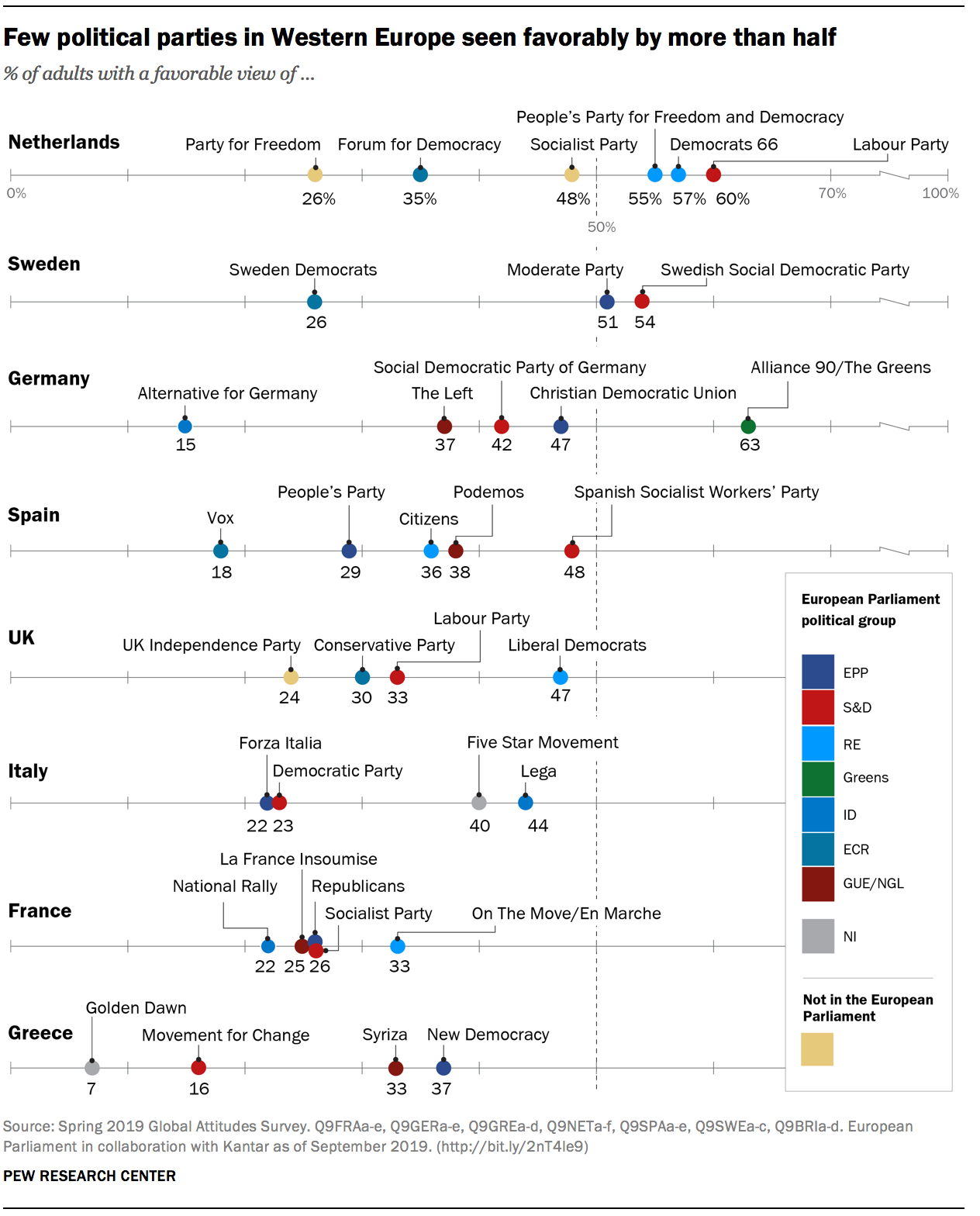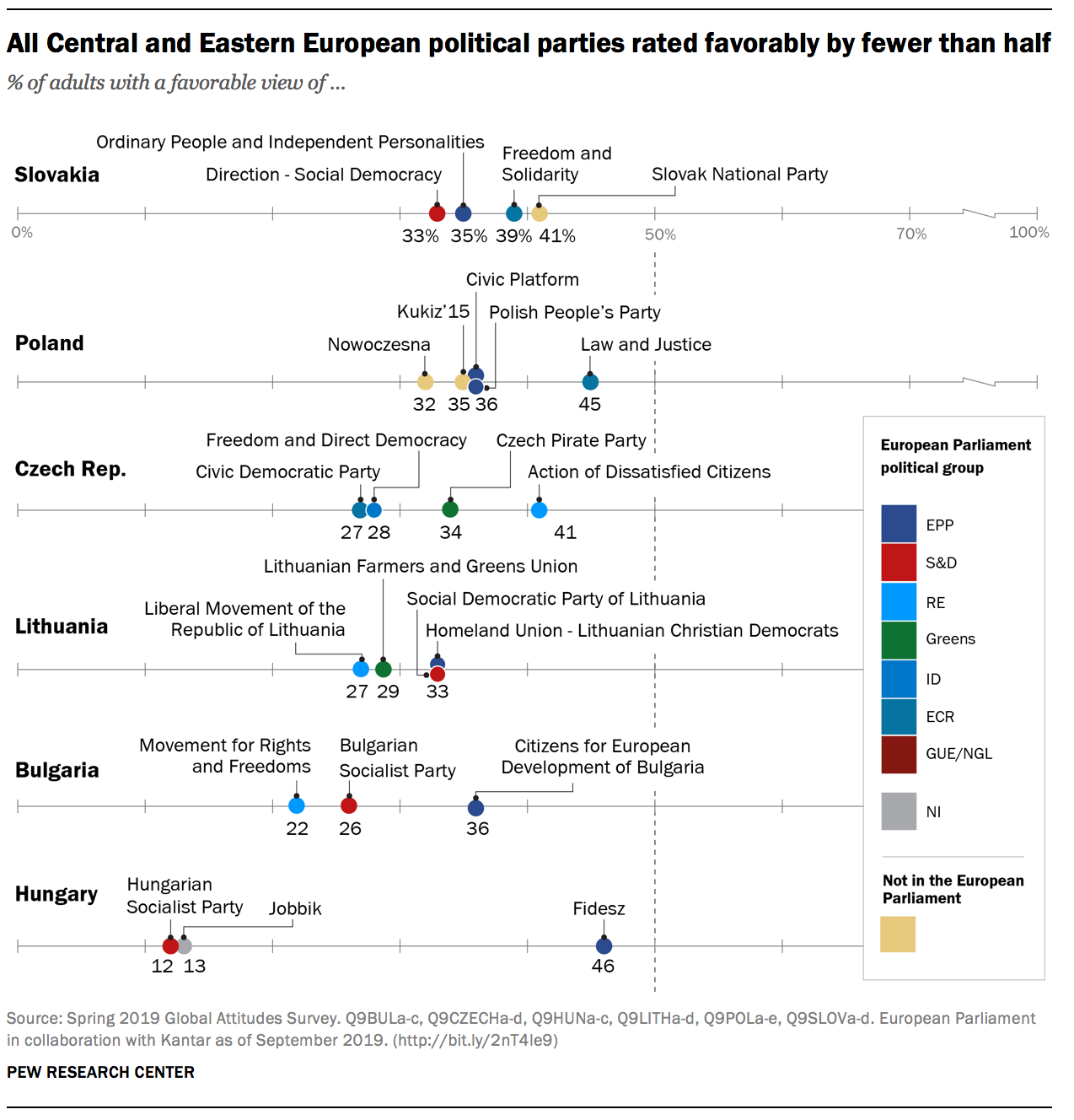Across the 14 European Union countries surveyed, few express positive views of political parties. Only six parties (of the 59 tested) are seen favorably by half or more of the population. Populist parties across Europe also receive largely poor reviews. Of the 21 populist parties asked about in the survey, only six receive positive reviews by four-in-ten or more of the population; all six were also part of the government in their respective countries when the survey was fielded.
 Parties in the European Parliament are grouped into supranational political groups based on political affiliation. In the current legislative period, which will continue until 2024, there are seven political groups: the Group of the European People’s Party (EPP), the Group of the Progressive Alliance of Socialists and Democrats in the European Parliament (S&D), the European Conservatives and Reformists Group (ECR), Renew Europe Group (RE), the Confederal Group of the European United Left/Nordic Green Left (GUE/NGL), the Group of the Greens/European Free Alliance (Greens/EFA) and Identity and Democracy (ID). There are also non-attached members of parliament (NI) who are not affiliated with any of the political groups.
Parties in the European Parliament are grouped into supranational political groups based on political affiliation. In the current legislative period, which will continue until 2024, there are seven political groups: the Group of the European People’s Party (EPP), the Group of the Progressive Alliance of Socialists and Democrats in the European Parliament (S&D), the European Conservatives and Reformists Group (ECR), Renew Europe Group (RE), the Confederal Group of the European United Left/Nordic Green Left (GUE/NGL), the Group of the Greens/European Free Alliance (Greens/EFA) and Identity and Democracy (ID). There are also non-attached members of parliament (NI) who are not affiliated with any of the political groups.
Political party favorability in Western European countries
 Compared with other nations, political parties in the Netherlands receive relatively positive reviews. The Labour Party (PvdA) is seen favorably by 60% of the public, and majorities give favorable ratings for the governing parties Democrats 66 (D66) and the People’s Party for Freedom and Democracy (VVD), with 57% and 55%, respectively. About half (48%) hold a positive view of the Socialist Party (SP). In contrast, the right-wing populist Forum for Democracy (FvD), which won the largest share of seats in the 2019 provincial elections, is seen favorably by 35%. Geert Wilders’ right-wing populist Party for Freedom (PVV) receives positive evaluations from about a quarter of the Dutch.
Compared with other nations, political parties in the Netherlands receive relatively positive reviews. The Labour Party (PvdA) is seen favorably by 60% of the public, and majorities give favorable ratings for the governing parties Democrats 66 (D66) and the People’s Party for Freedom and Democracy (VVD), with 57% and 55%, respectively. About half (48%) hold a positive view of the Socialist Party (SP). In contrast, the right-wing populist Forum for Democracy (FvD), which won the largest share of seats in the 2019 provincial elections, is seen favorably by 35%. Geert Wilders’ right-wing populist Party for Freedom (PVV) receives positive evaluations from about a quarter of the Dutch.
Sweden’s governing party, the Swedish Social Democratic Party (SAP), is seen favorably by 54% of the country’s population, a 9 percentage point increase from 2018. The Moderate Party is viewed positively by roughly half of Swedes, and the right-wing populist Sweden Democrats get positive reviews from about a quarter of Swedes (26%).
In Germany, a majority of 63% say they have a favorable view of Alliance 90/The Greens, making it the top-rated party in Germany and in the EU. This is a 10 percentage point increase from the share who said the same last year. The two governing parties asked about are seen favorably by about four-in-ten or more Germans, with 47% expressing positive views of the Christian Democratic Union (CDU) and 42% saying the same of the Social Democratic Party of Germany (SPD). The Left is seen positively by 37%, and the right-wing populist Alternative for Germany (AfD) by only 15% of Germans.
Spain’s governing Spanish Socialist Workers’ Party (PSOE), which won the April elections but failed to form a government, receives the most positive reviews in Spain. Roughly half (48%) see the party favorably, a 9-point increase from 2018. Podemos, a left-wing populist party, saw a similar increase, with 38% saying they have a favorable view of the party today compared with 30% last year. The Citizens party is seen positively by a similar share (36%). Vox and the former governing party, the People’s Party (PP), are held in a positive light by 29% and 18%, respectively.
The Liberal Democrats are seen favorably by 47% of Britons, making it the party with the greatest share of positive evaluations in the UK, up 13 percentage points from last year. The Labour Party is seen positively by 33% of Britons, a 12-point drop, and only three-in-ten have positive views of the governing Conservative Party. The right-wing populist UK Independence Party (UKIP) is seen positively by about a quarter of Britons, an increase of 7 points.
Before Italy’s right-wing populist Lega withdrew from a governing coalition with the Five Star Movement (M5S), the party was seen favorably by 44% of Italians. M5S received favorable ratings from four-in-ten. These ratings make the two parties among the most favorably seen populist parties in Europe. Still, this marks a 9 percentage point decline from 2018 for M5S. The other two parties included in the survey, the Democratic Party (PD) and Forza Italia (FI), are seen favorably by only about a fifth of the population (23% and 22%, respectively).
Among the French political parties tested, President Emmanuel Macron’s On the Move/En Marche receives the most positive reviews. A third say they have a favorable view of the party, but this marks a 14 percentage point decline since 2018, when 47% held that view. The Socialist Party and the Republicans (LR) both receive positive evaluations from 26% of the public. Left-wing populist party La France Insoumise receives favorable ratings from a quarter of the French, while Marine Le Pen’s right-wing populist National Rally (FN, formerly known as National Front) is seen positively by 22% of the French, a 10-point increase from 2018. This makes FN the only French party that has seen an increase in the share of people who see it positively.
In Greece, New Democracy (ND) – the party of newly elected Prime Minister Kyriakos Mitsotakis – is perceived positively by the largest share of people, albeit still under half the public.1 With nearly four-in-ten saying they have a favorable view of ND, this is a 15 percentage point increase from 2018. The former governing party, Syriza, saw a similar increase, with 33% of Greeks holding a positive view of the party this year compared with only 16% last year. Movement for Change (Kinima Allagis-KINAL) is seen favorably by 16% of Greeks, and the right-wing populist Golden Dawn (XA) by only 7%.
Political party favorability in Central and Eastern European countries
 Slovaks feel most positively about the right-wing populist Slovak National Party (SNS), one of the country’s governing parties. This party is seen favorably by 41% of the population. Freedom and Solidarity (SaS) is similarly seen favorably by around four-in-ten (39%). In contrast, two other parties asked about in the survey are only viewed in a positive light by around one-third of Slovaks: the right-wing populist Ordinary People and Independent Personalities (OLaNo-NOVA), and Direction–Social Democracy (Smer-SD).
Slovaks feel most positively about the right-wing populist Slovak National Party (SNS), one of the country’s governing parties. This party is seen favorably by 41% of the population. Freedom and Solidarity (SaS) is similarly seen favorably by around four-in-ten (39%). In contrast, two other parties asked about in the survey are only viewed in a positive light by around one-third of Slovaks: the right-wing populist Ordinary People and Independent Personalities (OLaNo-NOVA), and Direction–Social Democracy (Smer-SD).
Ahead of parliamentary elections in fall 2019, 45% of Poles express favorable views of Law and Justice (PiS), the current right-wing populist governing party. Civic Platform (PO), founded by former prime minister Donald Tusk, comes second with 36% of Poles seeing it favorably, a 7 percentage point increase from 2018. Nowoczesna has also seen a large increase in its favorability rating, with 32% of Poles having a favorable view of the party now compared with 22% in 2018. The other two parties, Polish People’s Party (PSL) and Kukiz’15, both members of the Polish Coalition, receive similar shares of positive evaluations (36% and 35%, respectively).
The share of Czechs with favorable opinions of each political party is also relatively low. The governing party Action of Dissatisfied Citizens (ANO 2011) – a centrist populist party that is part of Renew Europe in the European Parliament – receives the largest proportion of positive views (41%). The Czech Pirate Party (Pirati) is seen positively by 34%, while the right-wing populist Freedom and Direct Democracy (SPD) and liberal-conservative Civic Democratic Party (ODS) are viewed similarly (28% and 27%, respectively).
Views of the political parties show little variation in Lithuania; the shares of Lithuanians expressing favorable views of each party fall within a 6 percentage point range. The Social Democratic Party of Lithuania (LSDP) and center-right Homeland Union–Lithuanian Christian Democrats (TS-LKD) are tied, with both being seen favorably by 33% of Lithuanians. The Lithuanian Farmers and Greens Union (LVŽS), which is also in the governing coalition, is seen positively by 29%, and the Liberal Movement of the Republic of Lithuania (LRLS) by 27%.
In Bulgaria, few see the three parties included in the survey favorably. The governing party Citizens for European Development of Bulgaria (GERB) is seen favorably by only 36% of the population. The Bulgarian Socialist Party (BSP) comes in second (26% favorable), and the Movement for Rights and Freedoms (DPS) receives the smallest share of positive evaluations (22%).
The governing party in Hungary, Fidesz, is seen far more positively than the two other Hungarian political parties asked about in the survey. Led by Prime Minister Viktor Orban, the right-wing populist party garners favorable views from 46% of Hungarians, a rating that is unchanged from last year. In comparison, 13% and 12% of Hungarians have positive views of the right-wing populist Jobbik (Movement for a Better Hungary) and social-democratic Hungarian Socialist Party (MSZP), respectively. For Jobbik, this is a 6 percentage point decline from the share who saw it favorably in 2018.


